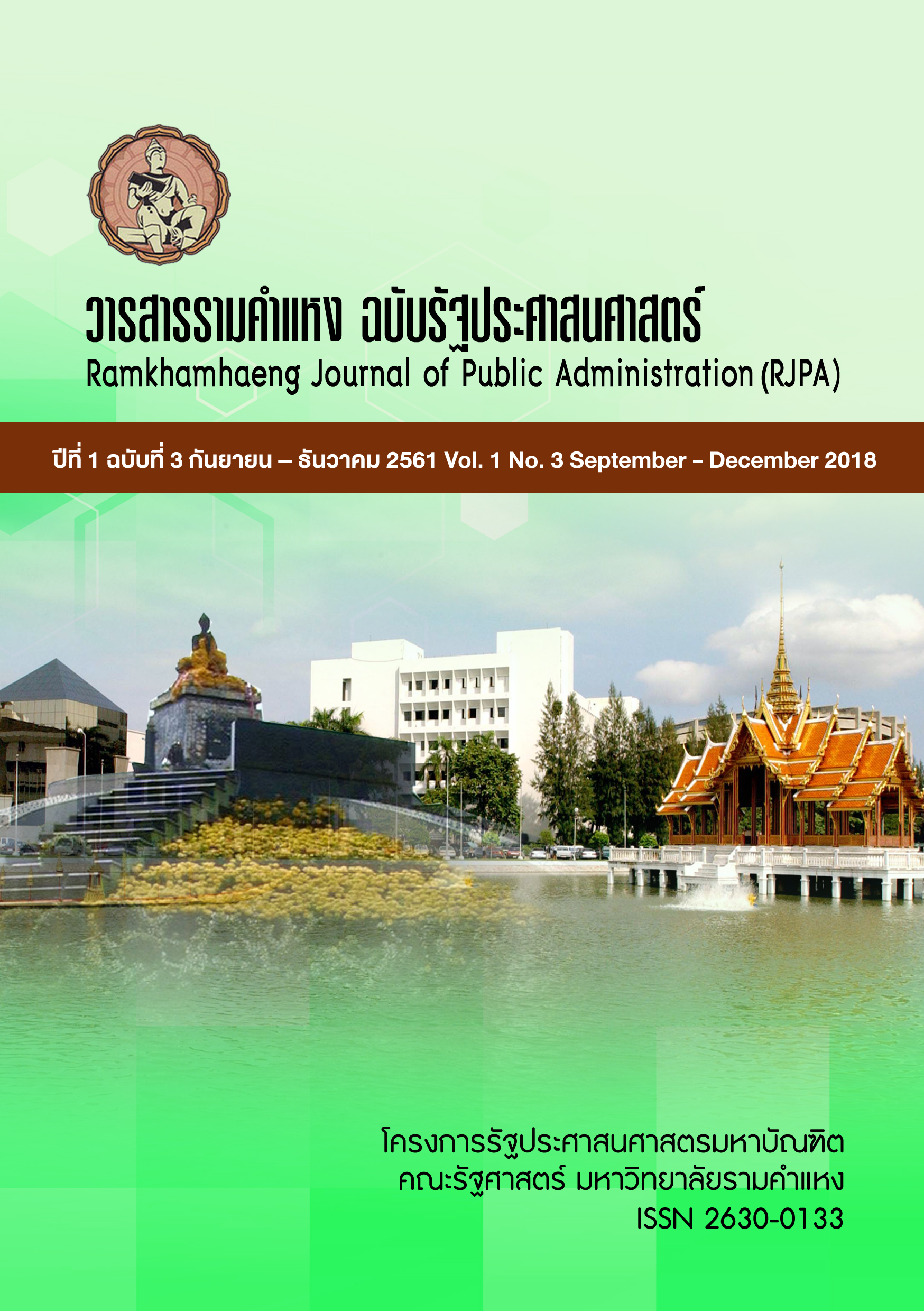เหตุแห่งการยุบพรรคการเมืองไทย (Causes of Dissolution of Thai Political Parties)
Abstract
บทคัดย่อ งานวิจัยนี้มีวัตถุประสงค์ต้องการศึกษาเหตุแห่งการยุบพรรคการเมืองที่ได้รับจดแจ้งการจัดตั้งตามพระราชบัญญัติประกอบรัฐธรรมนูญว่าด้วยพรรคการเมือง พุทธศักราช 2541 และพรรคการเมืองที่ได้รับจดแจ้งการจัดตั้งตามพระราชบัญญัติประกอบรัฐธรรมนูญ ว่าด้วยพรรคการเมือง พุทธศักราช 2550 อันเป็นผลมาจาก 1. การรัฐประหาร 2. คำสั่งศาลรัฐธรรมนูญ 3. ปัจจัยแวดล้อมภายในพรรคการเมือง และเพื่อศึกษาแนวโน้มในการพัฒนาระบบพรรคการเมืองของประเทศไทยในอนาคต โดยใช้การวิจัยเอกสาร (Documentary Research) นำข้อมูลที่ได้มาวิเคราะห์เชิงประวัติศาสตร์ เพื่อตอบวัตถุประสงค์ที่กำหนด ผลการวิจัยพบว่า จากการศึกษาพบว่า จากการศึกษาพบว่า เหตุการณ์การรัฐประหาร เมื่อวันที่ 19 กันยายน พ.ศ.2549 และเหตุการณ์การรัฐประหาร เมื่อวันที่ 22 พฤษภาคม พ.ศ.2557 จึงไม่ได้การยุบพรรคการเมืองแต่ประการใด การยุบเลิกพรรคการเมืองของประเทศไทยที่ผ่านมา โดยส่วนใหญ่จะถูกยุบเลิกพรรคการเมืองโดยคำพิพากษาหรือคำสั่งของศาลรัฐธรรมนูญ เนื่องจากพรรคการเมืองที่จัดตั้งขึ้นไม่สามารถดำเนินงานตามบทบัญญัติในรัฐธรรมนูญแห่งราชอาณาจักรไทย และบทบัญญัติในพระราชบัญญัติประกอบรัฐธรรมนูญ ว่าด้วยพรรคการเมือง ส่วนปัจจัยแวดล้อมภายในพรรคการเมืองที่มีผลต่อการถูกยุบเลิกพรรคการเมืองจะประกอบด้วย การที่สมาชิกพรรคการเมืองไม่ยอมรับภาวะผู้นำของหัวหน้าพรรค ความไม่ลงตัวในการจัดสรรผลประโยชน์ การขาดความคล่องตัวทางด้านการเงิน การไม่ได้รับความนิยมจากประชาชน การเกิดความขัดแย้งภายในพรรค การย้ายพรรคของหัวหน้าพรรคและสมาชิกพรรค ความล้มเหลวจากการเลือกตั้ง การถอนตัวของนักธุรกิจและกลุ่มผลประโยชน์ที่สนับสนุนพรรค และจากสถานการณ์ทางการเมือง ส่วนปัจจัยภายนอกที่ส่งผลต่อการถูกยุบเลิกพรรคการเมือง ก็จะประกอบด้วย ปัจจัยด้านสภาพแวดล้อมทางการเมือง การเปลี่ยนแปลงกติกาทางการเมืองที่รุนแรง และสภาพทางสังคม ส่วนแนวโน้มในการพัฒนาระบบพรรคการเมืองของประเทศไทยในอนาคตนั้น ผลการศึกษาพบว่า ในปัจจุบันประเทศไทยมีพรรคการเมืองทีได้รับจดแจ้งการจัดตั้งอย่างถูกต้องตามกฎหมายทั้งสิ้น 73 พรรคการเมือง ซึ่งลักษณะและแนวโน้มของพรรคการเมืองของประเทศไทยในอนาคต พรรคการเมืองในประเทศไทยจะต้องมีความสามารถในการปรับตัวให้เข้ากับสถานการณ์ของประเทศในขณะนั้น การสร้างความเป็นสถาบันให้กับพรรคการเมือง และการสร้างความเป็นปึกแผ่นให้กับพรรคการเมือง รวมทั้งการพัฒนาศักยภาพและภาวะผู้นำให้เป็นที่ยอมรับทั้งของสมาชิกของพรรคและสังคมภายนอก
Abstract This research aims to investigate the causes of the dissolution of political parties registered under the Constitutional Act on Political Party, B.E. 2541 and B.E. 2550, as a result of 1. the coup d'etat 2. orders of the Constitutional Court. And 3. internal political party. And also it aims to study trends in the development of Thailand's political system in the future. Using documentary research, historical data is analyzed to meet the objectives. The research found that the coup d'etat on September 19, 2006 and the coup d'etat on May 22, 2014 did not dissolve the political party. The dissolution of political parties in Thailand were mostly from the judgment or order of the Constitutional Court as the political parties were unable to operate in accordance with the provisions of the Constitution and the provisions of the Act on Political Party. The internal political factors affecting the dissolution of the political party are: members of the political party do not accept the leadership of the party leader, conflicts in the allocation of benefits, lack of financial flexibility, not popular with the public, conflicts within the party, withdrawal of party leaders and party members, lose in election , the withdrawal of businessmen and interest groups that support the party and from the political situation. The external factors that affect the dissolution of political parties consist of : political environment, violent political changes and social system. Concerning the trend in the development of the political system of Thailand In the future, the study indicated that, at present, Thailand has 73 political parties that have been officially registered. The political characteristics and trends of Thailand's political parties in the future are that: they must be able to adapt to the situation of the country at that time, institutionalize themselves and develop the potential and leadership recognized both by members of the parties and the society as a whole.




 Publication Policy (นโยบายการตีพิมพ์บทความ)
Publication Policy (นโยบายการตีพิมพ์บทความ) Publication Ethics (จริยธรรมการตีพิมพ์บทความ)
Publication Ethics (จริยธรรมการตีพิมพ์บทความ)